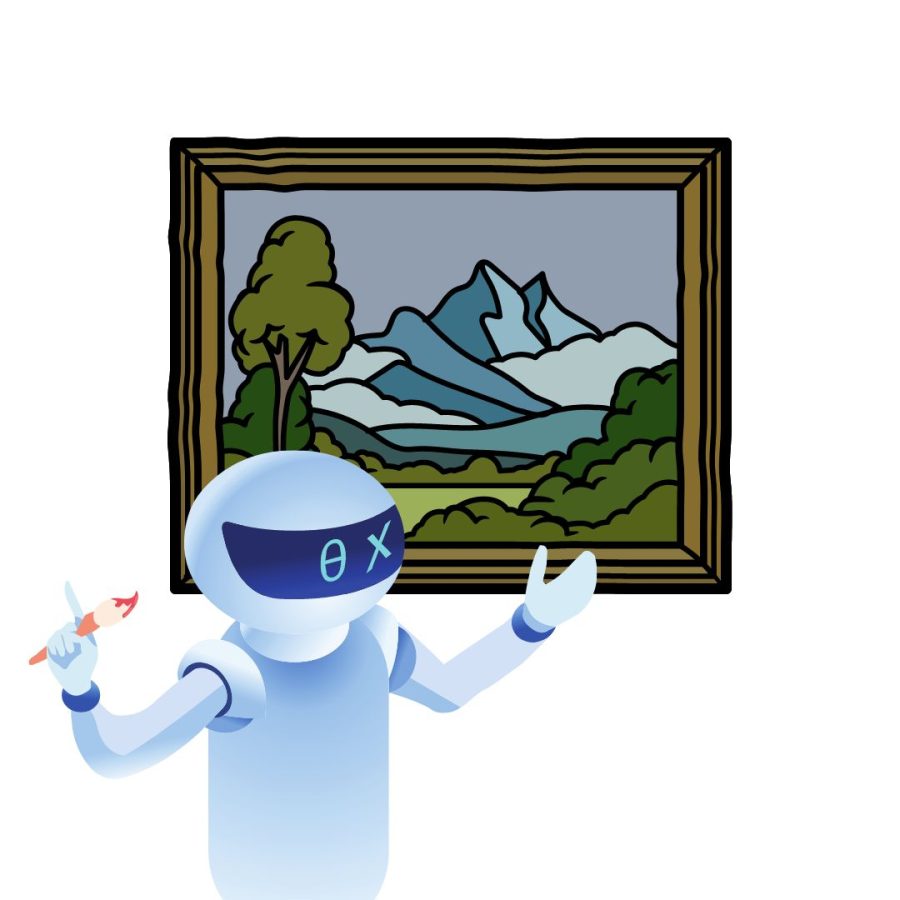AI Software Cannot Replace Artists
Artificial intelligence (AI) is set to compete against humans at a vast amount of things, from truck driving to playing Where’s Waldo?, activities that require precision and skill. That is why it seems strange to imagine AI infiltrating the fine arts, an industry defined by human creativity and individuality. AI is permeating into the creative spheres of the human experience, with some AI-generated art even winning awards in art competitions. Should artists be worried about these potential replacements? I don’t think so.
The technology behind these AI art creations, such as Midjourney or DALL-E, is really just an algorithm that has been made to look at a massive amount of pre-existing art and then generate an image based off of a user created prompt.
Initially, it may seem like a hit. AI generated art is a massive shortcut that could democratize the arts, letting anyone who can think of a picture produce that image. But art is something so inherently human that no AI can ever replace human made art.
If one were to look at Jason Allen’s award-winning AI-generated “Théâtre d’Opéra Spatial,” most will admit it’s a pretty picture. But it lacks personality. It doesn’t have a distinguishable style specific to one artist because it compiles the styles of thousands of artists. If you take a look at the other picture generated by Jason Allen via Midjourney, this disparity will be made clearer. Allen’s award-winning picture looks like a legitimate painting of the afterlife from a medieval artist, while his other painting looks like a poster for an overly CGI-edited sci-fi movie. These paintings could not be more stylistically different. Now look at any two paintings from Claude Monet. Can you tell that the same artist made those paintings?
We can see a similar occurrence in music. There is music software that can play Paganini’s 24th Caprice in A minor perfectly in every way, available to anyone, at any time. Yet people will still pay thousands of dollars to hear another human being perform it once. Why would someone pay more for an inherently flawed product, unless we prefer those human flaws?
By removing the person from art, you strip art of what makes it unique. The irreversibility of carving a block of marble or putting paint on canvas is a commitment. Art reflects our flaws, the imperfect nature of our hands. What makes art beautiful is not what was done right, but rather, the little quirks that trace the art back to its creator. Creating art doesn’t advance the interests of our species, nor does it satisfy any biological urges.
This doesn’t mean that artists should be worry-free, however. These competitions have to rank the submissions by some sort of metric, which is usually based on the performance of different artistic techniques. No human can compete with AI when it comes to technical precision and perfection. Many of these competitions pay the bills for small artists. Unless AI is banned from these competitions, art as we know it will die.
AI systems like Midjourney destroy the creative process of making art. When Allen generated his works, I strongly doubt that he envisioned anything close to what the final product would be, if he even had a vision of what it was going to look like. He simply thought of a string of words and was lucky enough to end up with a pretty picture. When “Impression, Sunrise” was being painted, Monet was looking out at the bay of Le Havre, transferring what he saw onto the canvas, immortalizing his hometown through his work.
I am not an artist, and, to be fair, I definitely can’t claim to understand how the codes behind AI systems work. However, I understand why art has value: because the person who made it has put their blood, sweat and tears into the medium. Art is a human product. It is a fragment of the artist and a result of their vision. What meaning does paint on a canvas have if a machine that has never experienced the real world, for no other reason than because it was programmed to, put it there?
Owen Sibal, FCRH ’26, is a political science major from Richmond, V.A.










































































































































































































